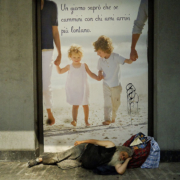Multifamily Group Functions as a treatment for psychosis and as an organizational model of mental health services.
Abstract
This paper intends to question how the contemporary predominant medical paradigm can understand and consider psychosis and as it builds its therapeutic care systems.
It is required at the reader to better and deeply analyze everyday experiences of therapies and not only to trust to excessive medicalization (predominant today), inviting him/her to place him/herself in the place of the other, in this case, the one labeled as a “crazy one”.
That’s why we insist on the familiar and social roots of psychosis, contextualizing it as expression of traumas in which the pathogenic reciprocal interdependencies violate the Human Rights of all patients in general as we can observe in multi-familiar groups.
The predominant contemporary medicalized paradigm cannot be sustained as effective, if related to mental states of psychotic conditions of extreme vulnerability. The contributions of Multifamily Psychoanalysis and the perspective of the attention to Human Rights, in the totality of cases, seems to be of greater utility both in practice and in the relationship with patients.
CIPRES´s research team suggests a new conception of the Rehabilitation discipline that may contribute to the epistemological change and, as a Read more

